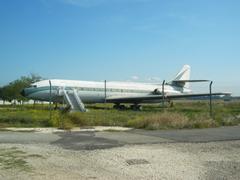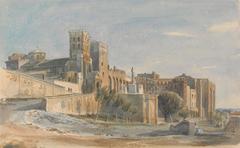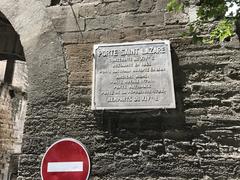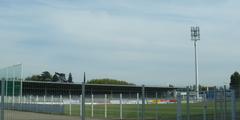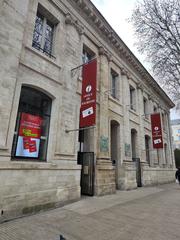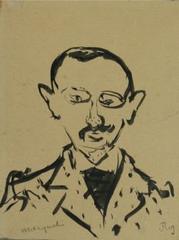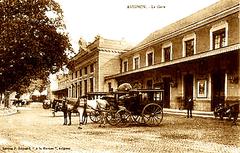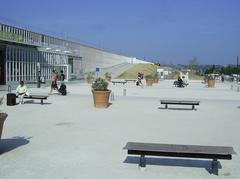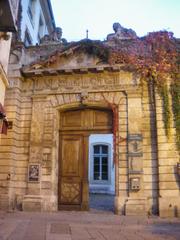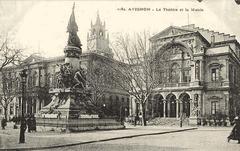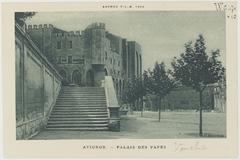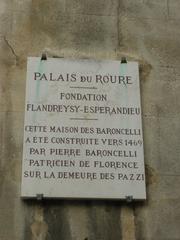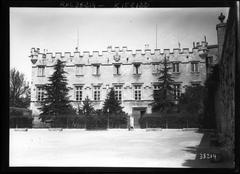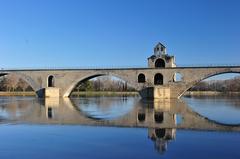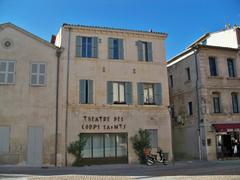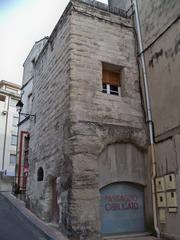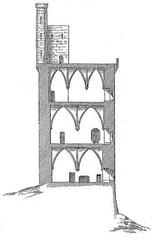
Synagogue d’Avignon: Visiting Hours, Tickets, and Comprehensive Visitor Guide
Date: 04/07/2025
Introduction
Nestled in Avignon’s historic center, the Synagogue d’Avignon is both a living place of worship and a powerful symbol of Jewish endurance, culture, and architectural innovation. Its roots stretch back to late Roman times, making it not only an essential destination for visitors interested in Avignon’s multicultural heritage but also a unique lens through which to explore the city’s evolution. This guide provides a well-structured overview of the synagogue’s history, architectural highlights, community role, and all the practical information needed for an enriching visit (JGuide Europe; Synagogues360; Culture.gouv.fr).
Table of Contents
- Historical Overview
- Architectural Highlights
- The Synagogue’s Community Role
- Visitor Information
- Nearby Attractions
- Frequently Asked Questions (FAQ)
- Conclusion & Further Resources
Historical Overview
Origins and Early Presence
Archaeological evidence, including a fourth-century seal depicting a five-branched menorah inscribed “avinionensis,” confirms that a Jewish community has existed in Avignon at least since late antiquity (JGuide Europe). Throughout the Middle Ages, Jews contributed to local commerce and culture, forming an integral part of Provence’s historical fabric.
Papal Protection and the Carrière
The 14th century marked a period of growth and relative security for Avignon’s Jews. The city, then under papal control, offered protection denied to Jews elsewhere in France, who faced expulsion in 1306. The Jewish quarter—known as the “Carrière”—became a vibrant hub, home to synagogues, schools, and charitable institutions (Kosher River Cruise).
Trials, Renewal, and Modern Era
After enduring recurring taxes, restrictions, and periodic hostility, the community rebuilt itself multiple times. The current synagogue was constructed in 1846 after a devastating fire destroyed its medieval predecessor. During World War II, Avignon became a haven for Jewish refugees, and postwar arrivals from North Africa revitalized the community, whose traditions now blend Ashkenazi and Sephardi influences (JGuide Europe).
Architectural Highlights
Exterior and Overall Form
The Synagogue d’Avignon’s neoclassical design stands out in the city’s architectural landscape. The understated façade, defined by harmonious proportions and minimal ornamentation, reflects a deliberate shift from the ornate baroque style of earlier religious buildings (Synagogues360; Culture.gouv.fr).
Central Rotunda and Dome
A rare feature among European synagogues, the central rotunda is supported by superimposed Ionic and Corinthian columns, giving the prayer hall a sense of openness and verticality. The dome, pierced by an oculus, bathes the white interior in natural light, creating a luminous and contemplative atmosphere (France-Voyage; Wikipedia).
Interior Layout
The prayer hall’s square plan, with a central bimah surrounded by wooden stalls and a women’s gallery above, fosters communal worship. Walnut furnishings add warmth, and the Torah ark is set against the eastern wall, in keeping with Jewish tradition (Synagogues360). Unlike other regional synagogues, it lacks a “siège d’Élie” (Elijah’s chair), highlighting local liturgical distinctions (Wikipedia).
Ritual Objects and Artistic Heritage
The synagogue houses historic ritual objects, some classified as French national heritage, and the original design ensures stylistic unity throughout. The restrained decorative scheme emphasizes the building’s architectural form and spiritual purpose (Culture.gouv.fr).
The Synagogue’s Community Role
Religious and Cultural Hub
Since its inception, the synagogue has served as the heart of Jewish life in Avignon. Historically, adjacent facilities such as a mikveh, kosher butchery, and matzah oven underscored its communal role (Wikipedia). Today, it continues to host religious services, life-cycle events, and cultural activities.
Unique Liturgical Traditions
The Avignon rite is distinct from those of other Provençal communities, shaped by both local practice and, after 1808, the influence of the Marseilles consistory. The synagogue remains a vital center for preserving these traditions.
Symbol of Resilience
Through periods of crisis—from medieval restrictions to the Holocaust and beyond—the synagogue has embodied the community’s capacity for renewal. Its continued vitality is a testament to the enduring presence of Jewish culture in the region (JGuide Europe).
Visitor Information
Location and Access
- Address: Place Jérusalem (now Place Victor-Basch), 84000 Avignon, France
- Nearby Landmarks: Palais des Papes, Pont Saint-Bénézet, and the Avignon historic center
- Access: 15-minute walk from Gare d’Avignon Centre; public buses and nearby parking available (Avignon Tourism Office)
Visiting Hours (as of 2025)
- Monday–Friday: 10:00 AM – 12:00 PM
- Closed: Saturdays, Sundays, and Jewish holidays
- Entry: Ring the doorbell for admission (Provence Guide)
Tickets and Tours
- Admission: Free; donations are appreciated to support upkeep and community projects
- Guided Tours: Available by appointment; recommended for groups and those seeking in-depth historical context. Tours in English can be arranged with advance notice (ACI Avignon)
Accessibility
- Wheelchair access: Ramps and accessible pathways provided; contact ahead for assistance
- Languages: French is primary, but English tours available upon request
Visitor Requirements and Etiquette
- Identification: May be required for security reasons
- Dress Code: Modest attire; men should wear a kippah (provided at entrance)
- Photography: Permitted outside and in non-service times; no flash and always ask permission
- Behavior: Maintain a respectful demeanor, especially during services
Kosher and Community Services
- Kosher meal and accommodation information available through the synagogue (Kosher Delight)
Nearby Attractions
- Palais des Papes: Avignon’s iconic papal palace, a UNESCO World Heritage site
- Pont Saint-Bénézet: Famed medieval bridge
- Place de l’Horloge: Main square with cafés and theaters
- Musée Calvet: Fine arts and archaeology museum
Combine your synagogue visit with other landmarks for a comprehensive exploration of Avignon.
Frequently Asked Questions (FAQ)
Q: What are the visiting hours?
A: Monday to Friday, 10:00 AM–12:00 PM; closed on weekends and Jewish holidays.
Q: Is there an entrance fee?
A: Admission is free; donations are welcome.
Q: Are guided tours available?
A: Yes, by appointment. Contact the synagogue or tourism office; English tours available on request.
Q: Is the synagogue accessible to those with mobility challenges?
A: Yes, but contact in advance to arrange assistance.
Q: Can I take photos inside?
A: Yes, but not during services and without flash. Always ask staff for permission.
Q: What should I wear?
A: Modest attire is required; men are provided with a kippah.
Conclusion & Further Resources
The Synagogue d’Avignon is a rare and beautiful testament to Jewish history, architecture, and resilience in Provence. Its central rotunda, neoclassical design, and vibrant community life offer visitors a unique opportunity to connect with both Avignon’s Jewish heritage and its broader cultural tapestry. For those planning a visit, advance preparation—such as booking guided tours and respecting religious customs—ensures a meaningful experience.
Enhance your journey with the Audiala app for curated tours and updates, and explore other Avignon landmarks to fully immerse yourself in the city’s rich history.
References and Further Reading
- JGuide Europe
- Synagogues360
- Culture.gouv.fr
- Official Synagogue d’Avignon Website
- Avignon Tourism Office
- ACI Avignon
- Provence Guide
- France-Voyage
- Wikipedia
- Kosher Delight
- Kosher River Cruise
- Travels On Point
- Travelfrancebucketlist


